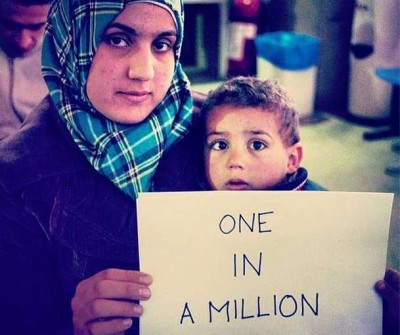
By: Johan Eldebo
A few days ago I returned from Lebanon to the UK. On previous visits to Beirut I have enjoyed the hospitality, diversity and complexity of the city. Now I marvel at one of the few places in the world where you can find a Starbucks, refugee camp, fancy outdoor restaurants and bullet-ridden buildings all within walking distance of each other. Like London, Beirut has been devastated by war and rebuilt. Unlike London, Beirut has faced rocket attacks in the last few weeks.
Lebanon is experiencing some significant challenges. Today the United Nations announced it will cost $1.3 billion (or £840 million) to respond to the growing crisis of Syrian refugees pouring into the country. More than one million Syrians are expected to have fled to Lebanon by the end of the year, a staggering amount for a country to take in when their own population is only four million.
I visited an informal settlement in the north of Lebanon, just minutes from the Syrian border, where this was all too apparent. In a field in the outskirts of a small town, perhaps a hundred refugees of all ages were renting a small piece of land where they had lived for some six months in makeshift tents.
They seek to create some semblance of normality – but it is simply impossible to maintain – as more and more refugees arrive and local supplies run out. Schools are teeming with pupils, trying but struggling to accommodate all of the arriving children. Once at school, the Syrian children struggle with the new curriculum, and the local children struggle with larger groups of pupils. Vaccinations at the nearby hospital are running low. The local football field has become another refugee settlement. Garbage and waste from the settlement is collected irregularly, causing sanitary problems for both the refugees and for the Lebanese who live just across the street. No one knows how long they will stay. The refugees are anxious to be able to
return home safely.
It is in this way that many towns around Lebanon have seen their populations double in recent months. The UN now expects the refugee numbers to double again to above one million by Christmas. Add to this more than 500,000 Palestinian refugees already in the country and that could mean that more than 30 per cent of the people in Lebanon would be refugees. The same number in the UK is 0.3 per cent.
This staggering reality facing Lebanon is the background to the dramatic increase in aid now required under the new UN plan – $1.3bn by the end of 2013 in the country alone. To put this into perspective, the annual humanitarian spending globally was $18bn last year. This is clearly an enormous amount, and one that will be difficult to raise.
Although Lebanon’s recovered from its years of conflict remarkably well, it’s still a country of extremes. The bustling glamorous shopping malls of the newly rebuilt downtown Beirut exudes confidence, but in the city suburbs and rural areas there is gripping poverty and high unemployment. Here, the talk on the streets is of a genuine fear of a return to conflict.
Whilst enjoying some of the traditionally strong coffee served in the city cafes, I can only hope that the world will realize that even if we cannot at the moment find a solution to the conflict in Syria, we can make a difference in Lebanon. We cannot sit by and wait as the situation gets worse. Today’s figures show this crisis is only just beginning. For the sake of the children in the refugee camps, for Lebanon’s children and for the wider world we all need to take notice.
Johan Eldebo is Senior Humanitarian Policy Adviser for World Vision, based in London
The Independent

Leave a Reply
You must be logged in to post a comment.